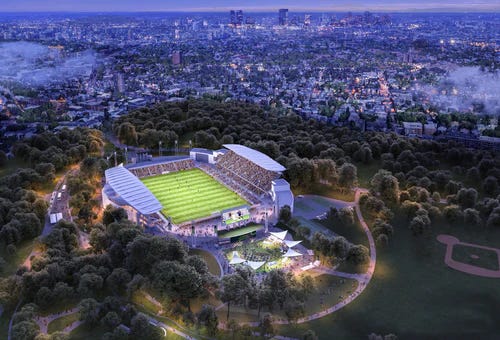Harris advisors blaming everyone but themselves | Time to call out corrupt pols for who they are | Boston mayor sees tax hike, stadium plans unravel | Quick hits |
News tips? Story ideas? Email us at sbvanvoorhis@hotmail.com
Number games: Wu administration playing fast and loose with the math as it pushes controversial tax hike and stadium proposals
Truth can be relative in politics as facts are stretched to fit the narrative or message of the day.
But by being less than upfront, if not downright deceptive, about the true cost of her two biggest and most controversial initiatives, Boston Mayor Michelle Wu may have pushed that concept to its breaking point.
Wu’s lack of candor has turbocharged opposition to her proposal to hike tax rates on struggling commercial buildings and businesses in Boston, throwing its required passage by the state Senate into doubt.
And ditto for her cherished plan to transform a decrepit high school field in Franklin Park, one of the links in the historic Emerald Necklace, into a 10,000 seat stadium for a women’s pro soccer team.
In the space of just a few days, both proposals have begun unraveling as the estimates the Wu administration has been using to sell its plans have imploded.

The first to crumble? That honor goes to Wu’s push for final State House approval to shove more of Boston’s tax burden onto the city’s already beleaguered commercial property base than currently allowed under state law.
Wu has spent months wrangling with the Legislature over a proposal that would head off a potential $1 billion revenue gap over the next few years as office tower values crumble amid the shift to remote work.
In fact, Wu has repeatedly warned that without the shift, Boston homeowners would instead be forced to pick up the slack in the form of huge increases to their tax bills.
But on Thursday, top business and fiscal watchdog groups called for “pausing” consideration of Wu’s proposal to hike commercial property tax rates.
The statement followed the release of new numbers by the Wu administration that called into question the need for the whole plan in the first place.
Business groups had reluctantly agreed back in October to the tax shift on the belief it was necessary to spare Boston homeowners from an unbearably large increase.
Yet the Wu administration is now saying that without the tax shift, city homeowners would face a 10.5 percent jump - far lower than what the city had previously warned, and roughly in line with increases of previous years.
And with the tax shift, it would knock that increase down to 5 percent - great for Wu as she gears up for a reelection next year, but hardly a compelling case for endangering Boston’s already struggling downtown and half-empty office buildings.
All of which has city business leaders questioning how the numbers could have changed in a matter of a few weeks - and whether they were sold a bill of goods back in October, when Wu and her aides had warned of a much more dire situation.
The Wu administration presented those now grossly inaccurate numbers in three separate hearings, two at the State House and one before the City Council, said Greg Maynard, head of the Boston Policy Institute, in a statement.
“It is clear from the numbers announced last night that Boston officials have been providing extremely inaccurate data on future tax rates to the public, press, and elected officials throughout 2024,” Maynard said.
If that weren’t enough, Thursday’s tax plan revelations were followed by news on Friday that the price tag for Wu’s soccer stadium proposal has doubled to $200 million.
That, in turn, could mean a big hit for Boston taxpayers, with the city now on the hook for $91 million, up from $50 million before, having previously agreed to cover half the cost of the project with BOS Nation, the women’s pro team that would play in the new soccer palace, the Globe reports.

The timing here also looks fishy, with the news that the project will cost far more than anticipated coming after the Wu administration has already lined up most, if not all, of the city and state approvals needed to move forward.
The cost should not have come out of the blue: A new women’s soccer team in Cleveland, a much less expensive market to build in, was nearing the $200 million mark this past May.
Let’s get real here: Globe’s coverage of Boston city councilor indicted on federal corruption charges takes her far too seriously
From reading the Globe, you would think Tania Fernandes Anderson was an civil rights icon, not a two-bit local pol with a foul mouth and a bad temper.
Keep reading with a 7-day free trial
Subscribe to Contrarian Boston to keep reading this post and get 7 days of free access to the full post archives.


